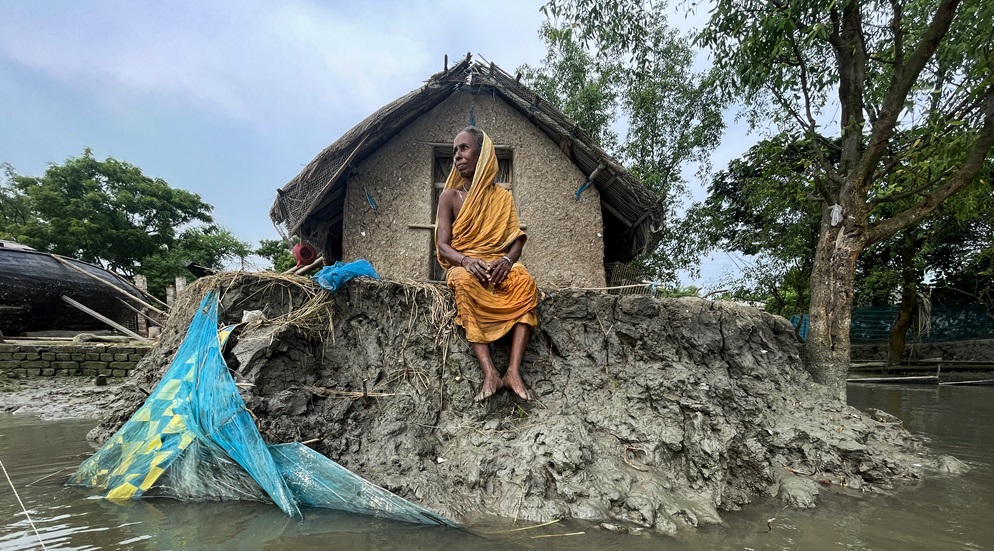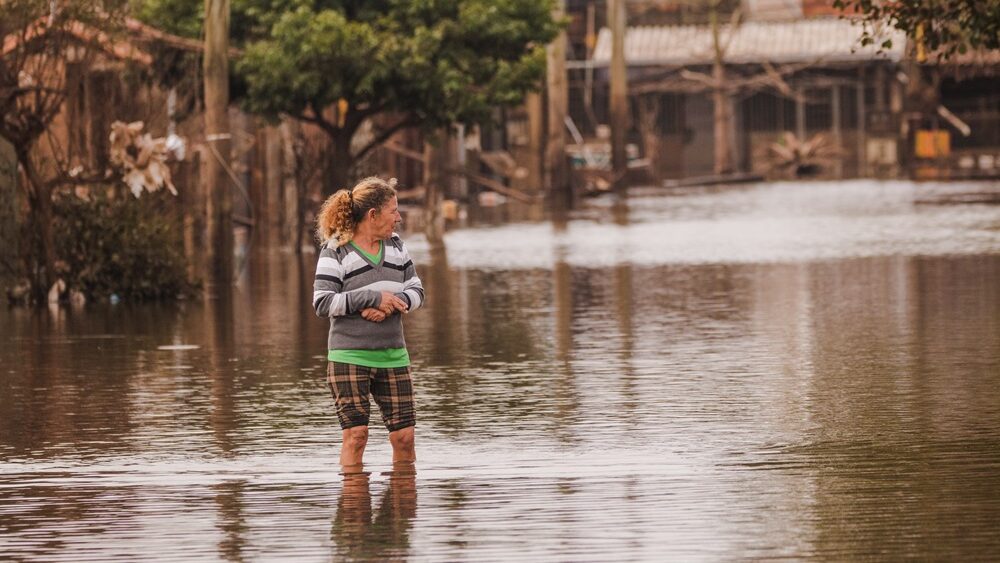PDD Key Messages for the Intergovernmental Conference to Adopt the Global Compact for Safe, Orderly and Regular Migration
Marrakech, Morocco on the 10th and 11th of December, 2018
1. Background
Every year, millions of people are forced to leave their homes because of floods, tropical storms, droughts, melting permafrost, desertification, sea level rise, earthquakes and other natural hazards. Many find refuge within their own country, but some have to move abroad. While some movement is well documented, the total number of disaster displaced persons is unknown. Present international law does not provide a right to admission and stay for those compelled to leave their country of origin. Scientists project that climate change will increase disaster displacement in the future, both internally and across borders. Disaster displacement has devastating effects on people and communities. It creates complex humanitarian and development challenges that urgently call for cooperation, partnerships and action at all levels.
The Global Compact for Safe, Orderly and Regular Migration (Compact) will be adopted at an intergovernmental conference in Marrakesh on 10-11 December. It is the first document negotiated in the framework of the United Nations in which the international community makes specific commitments to address the drivers that compel people to leave their countries of origin in the context of natural hazards, environmental degradation and the adverse effects of climate change, and to protect and assist those who are compelled to leave their countries in these contexts.
The implementation of the Compact offers a unique and historic opportunity to address the challenges of human mobility in the context of disasters and the adverse effects of climate change, in all its different forms (displacement, migration and planned relocation), in line with international standards and at different levels of implementation (sub-national, national, regional and global).
The Compact contains 23 objectives with corresponding commitments, policy instruments and actions needed to fulfil them. Most of the objectives are relevant in situations of disaster displacement, but three speak directly to what needs to be done to prevent forced movement and disaster displacement, reduce and minimize the risk of people being displaced, and outline how to assist and protect those compelled to move from their country of origin in the context of disaster and environmental degradation, namely:
- Objective 2 (“Minimize the adverse drivers and structural factors that compel people to leave their country of origin”)
- Objective 5 (“Enhance availability and flexibility of pathways for regular migration”), and
- Objective 23 (“Strengthen international cooperation and global partnerships for safe, orderly and regular migration”)
2. PDD Key Messages at the Migration Week 5-11 December 2018, including at the Intergovernmental Conference to Adopt the GCM
The Nansen Initiative Agenda for the Protection of Cross-Border Displaced Persons in the Context of Disasters and Climate Change (Protection Agenda) and the work of the Platform on Disaster Displacement (PDD) are explicitly recognised in the Compact as relevant for developing and implementing coherent approaches to the challenges of human mobility in the context of disasters, environmental change and the adverse effects of climate change.
PDD Steering Group members, other States and relevant Stakeholders are therefore encouraged to seize this moment to promote action and effective practices in line with recommendations from the Protection Agenda and the PDD.
In particular, Members States are encouraged to promote and commit to these messages during the Migration Week in Marrakesh, Morocco, December 2018:
- Welcome the adoption of the Global Compact for Migration, its global scope, forward-looking character and how, i.a. through objectives 2, 5 and 23, it outlines integrated and coherent approaches to address the challenges of human mobility in the context of disasters, environmental change and the adverse effects of climate change.
- Welcome the holistic perspective the GCM adopts, from addressing the factors that compel people to move to the need for better data to support evidence-based policies to enhancing legal pathways for people compelled to leave their countries of origin in the context of disasters.
- Recognize the relevance of the following actions, policy instruments and effective practices and pledge commitment to draw from them and scale them up when planning and implementing national migration policies:
- To help people at risk of displacement stay in their homes
- Strengthen climate change mitigation and adaptation action and implement sustainable development projects;
- Enhance national adaptation planning processes and include measures to address the challenges of human mobility and risk of disaster displacement;
- Integrate displacement considerations into disaster risk and preparedness strategies;
- Address the vulnerabilities of persons affected by disasters by ensuring they have access to humanitarian assistance and protection.\
- To help people affected by disasters move out of harm’s way
- Include cross-border displacement scenarios within bilateral and/or regional disaster contingency planning;
- Strengthen evacuation planning domestically and in cooperation with neighbouring countries;
- Consider planned relocation as a measure of last resort in consultation with affected communities;
- Create and expand pathways for regular migration to other countries in the context of extreme environmental degradation or in countries particularly prone to sudden-onset disasters and promote migration as a positive adaption measure.
- To better protect people forced to leave their homes in the context of disasters
- Based on humanitarian consideration, enhance the use of measures to create and expand safe legal pathways and legal migration opportunities for people displaced in the context of disasters and/or adversely affected by climate change, for example, using regular immigration law (e.g. temporary work permits), exceptional immigration categories (e.g. Humanitarian Visa and Temporary Protection), or provisions related to the protection of refugees or similar norms of international human rights law, when appropriate;
- Cooperate to find lasting and durable solutions for cross-border disaster-displaced persons, including by devising visa options and planned relocation schemes, in cases where adaptation in or return to country of origin is not possible.
- To help people at risk of displacement stay in their homes
- Commit to strengthen the evidence basis and support domestic efforts and international cooperation to joint analysis and information sharing to better map, understand and predict disaster displacement and its impacts, including through collecting sex and age disaggregated data to inform gender-sensitive interventions.
- Commit to strengthen the role of regional and sub-regional organizations as well as Regional Consultative Processes on Migration (RCPs) in the implementation of the Compact and their relevance as platforms for dialogue, cooperation, sharing of effective practices and policy development regarding disaster displacement, as well as, where appropriate, harmonization of effective practices or elaboration of agreements and other normative frameworks.
- Welcome the establishment of the capacity-building mechanism in the United Nations, call for the systematic inclusion of disaster displacement in its various pillars (connection hub, start-up and global knowledge platform), commit to provide resources and strengthen their capacity in this regard, and recognize their relevance in providing action and support to countries in the implementation of the Compact and their importance in supporting States to prepare for, reduce risk of and address disaster displacement.
- Welcome the United Nations Network on Migration and commit to supporting IOM as the coordinator and secretariat of the network. Encourage IOM to draw on the technical expertise and experience of a wide range of stakeholders, including the Platform on Disaster Displacement and its members, when developing and strengthening policies and practices addressing the challenges of human mobility in the context of disasters, environmental change and the adverse effects of climate change.
- Commit to continuous review of progress made in implementation of the Compact at sub-national, national, regional and global level, regarding, in particular, commitments on disaster displacement under objective 2 and 5, and prepare to share progress and discuss accomplishment in view of further strengthening and scaling up of effective practices and in preparation for the International Migration Review Forum in 2022.
Check out all of the disaster displacement-related events during Migration Week, 3-11 December 2018 here.
Learn more about the Intergovernmental Conference on the Global Compact for Migration
Download PDD’s Key Messages for the Intergovernmental Conference





